We spent two weeks in Vietnam. Hank and I spent the first week on a medical mission in the Mekong delta. We met up with Bill and Cat in Ho Chi Minh City for the second week. It wasn’t a lot of time in one country, but there was a lot to learn.
1. Countries work hard at molding their youth: 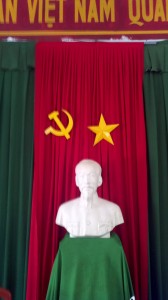 Phuong was my interpreter for most of the time is was doing medical mission work in Vietnam. She left Vietnam when she was 13. Now she has graduated from nursing school in California, and she joined us on our medical mission. One afternoon we were sitting together in one of the schools where we had set up our clinic. She pointed at Ho Chi Minh’s portrait above the chalkboard. She described the confusion she felt when she moved to the States. In Vietnam she had been taught to revere Ho Chi Minh. She had called him Uncle Ho as a child. When she moved to the States, all the Vietnamese she met reviled the man. She described to me how confused she was. How could Uncle Ho be evil? At the same time when I looked at Ho Chi Minh’s portrait it still felt that he was the enemy. I don’t know why. I grew up in a college town. The people who came to my home were college professors and graduate students. Everyone hated Nixon. No one supported the war. Everyone thought that the Vietnamese should have the right to self determination. Ho Chi Minh was even lauded by some as a leader who had the simple goal of freedom for his people. Yet on this trip when I saw a picture of Ho Chi Minh on a poster, or a hammer and sickle in a display, or a yellow star on a policeman’s hat, it just felt wrong. It felt creepy even. Like I was sleeping with the enemy. The government of the 60’s and 70’s must have worked pretty hard to indoctrinate me. It seems that it worked.
Phuong was my interpreter for most of the time is was doing medical mission work in Vietnam. She left Vietnam when she was 13. Now she has graduated from nursing school in California, and she joined us on our medical mission. One afternoon we were sitting together in one of the schools where we had set up our clinic. She pointed at Ho Chi Minh’s portrait above the chalkboard. She described the confusion she felt when she moved to the States. In Vietnam she had been taught to revere Ho Chi Minh. She had called him Uncle Ho as a child. When she moved to the States, all the Vietnamese she met reviled the man. She described to me how confused she was. How could Uncle Ho be evil? At the same time when I looked at Ho Chi Minh’s portrait it still felt that he was the enemy. I don’t know why. I grew up in a college town. The people who came to my home were college professors and graduate students. Everyone hated Nixon. No one supported the war. Everyone thought that the Vietnamese should have the right to self determination. Ho Chi Minh was even lauded by some as a leader who had the simple goal of freedom for his people. Yet on this trip when I saw a picture of Ho Chi Minh on a poster, or a hammer and sickle in a display, or a yellow star on a policeman’s hat, it just felt wrong. It felt creepy even. Like I was sleeping with the enemy. The government of the 60’s and 70’s must have worked pretty hard to indoctrinate me. It seems that it worked.
2. The American presence during the war was brutal: I already knew that intellectually. I grew up with the gruesome war photos of the 60’s and 70’s. It was in a era before the government censored the pictures of war.  But in the War Remnants Museum the pictures were displayed ad nauseum. There was no break from the horror. The first room was an homage to the war photographers who had died as collateral to the battles. Not just those covering the South Vietnamese and Americans but also those embedded with the North Vietnamese Army and the Viet Cong. The photos show horror after horror of American brutality, from the burning of villages to the My Lai massacre to the effects of Agent Orange generations after the war. It was overwhelming. I finally had to stop looking at every single picture. I was exhausted by the horror.
But in the War Remnants Museum the pictures were displayed ad nauseum. There was no break from the horror. The first room was an homage to the war photographers who had died as collateral to the battles. Not just those covering the South Vietnamese and Americans but also those embedded with the North Vietnamese Army and the Viet Cong. The photos show horror after horror of American brutality, from the burning of villages to the My Lai massacre to the effects of Agent Orange generations after the war. It was overwhelming. I finally had to stop looking at every single picture. I was exhausted by the horror.
4. The war was a tragedy for the American soldiers: Of course, I knew this one, too, but I felt it when we went to visit the Cu Chi tunnels. The tunnels have been incorporated into a park used to educate Vietnamese about the war. 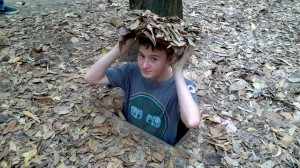 The Viet Cong built over 200 km of tunnels near Saigon as a conduit for supplies and protection from the war. The park is set up to show how the Viet Cong battled to obtain their freedom from the American aggressors. We began our visit by watching a movie. When the narrator talked about the rebels who won medals of commendation as “American Killers” my stomach turned. As we walked down the paths through the jungle we passed a line of booby traps. I could sense the fear a soldier would feel in the jungle watching for a Viet Cong ambush. We came to an American tank that had been destroyed by a bomb. Looking at the shell of the tank I felt the ghosts of the young, American soldiers in the jungle around me. Ghosts of men, no boys, not much older than Hank. It was such an incredibly sad feeling.
The Viet Cong built over 200 km of tunnels near Saigon as a conduit for supplies and protection from the war. The park is set up to show how the Viet Cong battled to obtain their freedom from the American aggressors. We began our visit by watching a movie. When the narrator talked about the rebels who won medals of commendation as “American Killers” my stomach turned. As we walked down the paths through the jungle we passed a line of booby traps. I could sense the fear a soldier would feel in the jungle watching for a Viet Cong ambush. We came to an American tank that had been destroyed by a bomb. Looking at the shell of the tank I felt the ghosts of the young, American soldiers in the jungle around me. Ghosts of men, no boys, not much older than Hank. It was such an incredibly sad feeling.
5. It’s hard to enjoy a country when you’re afraid of a scam: Everyone talks about the likelihood of being scammed in Vietnam. Even the Vietnamese-Americans say they get charged higher prices than the Vietnamese, just not as high as non-Vietnamese speaking tourists. We had to bargain for bus, bicycle rickshaw and motobike rides. We had to give up our money for laundry, toys, and a pair of scissors. I wanted to relax knowing that this was going to be part of the cost of traveling without speaking the language. Instead I was always on guard even losing it at one point (totally inappropriately, of course).
6. The food is so much better if you speak the language: Hank and I followed some friends to a market one evening. 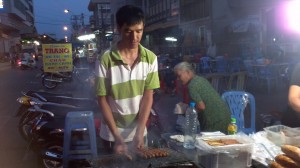 We had incredible sandwiches of grilled, spiced pork and Vietnamese pickles. On another evening our colleagues took us out for a banquet that included banh xeo, a crepe made with eggs and rice flour filled with pork and shrimp. Pieces are pulled off and wrapped in various leaves and herbs then dipped in sweet and sour fish sauce. It was so delicious we ordered extra banh xeo. In Ho Chi Minh City friends walked us miles to a restaurant we never would have found by ourselves. Even if we had found it on our own we would not have been able to read the menu. With friends guiding us we stuffed ourselves silly with sandwiches and fresh fruit juices and stirfries and jellied desserts.
We had incredible sandwiches of grilled, spiced pork and Vietnamese pickles. On another evening our colleagues took us out for a banquet that included banh xeo, a crepe made with eggs and rice flour filled with pork and shrimp. Pieces are pulled off and wrapped in various leaves and herbs then dipped in sweet and sour fish sauce. It was so delicious we ordered extra banh xeo. In Ho Chi Minh City friends walked us miles to a restaurant we never would have found by ourselves. Even if we had found it on our own we would not have been able to read the menu. With friends guiding us we stuffed ourselves silly with sandwiches and fresh fruit juices and stirfries and jellied desserts.
7. A family that plays together stays together, especially if joined by strangers: 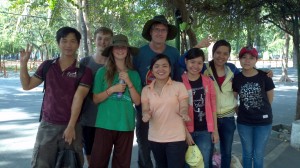 Everyone in Ho Chi Minh City plays foot shuttlecock. For 50 cents we bought a birdie and started to play. We were bad. Most of the time our feet did not make contact with the birdie. That didn’t stop Vietnamese from joining our game. In fact, they seemed to enjoy our failures. We sweated, we laughed, we made friends.
Everyone in Ho Chi Minh City plays foot shuttlecock. For 50 cents we bought a birdie and started to play. We were bad. Most of the time our feet did not make contact with the birdie. That didn’t stop Vietnamese from joining our game. In fact, they seemed to enjoy our failures. We sweated, we laughed, we made friends.
8. My son is becoming a really cool person: I was invited to participate in the medical mission some time in February. 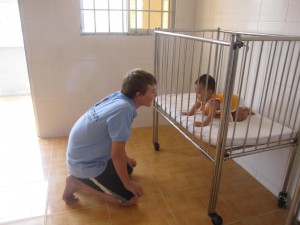 Bill did not want to do it. Neither did Cat. It was expensive. I really couldn’t imagine a way to make it work. Except Hank wanted to go. So he and I went to the Mekong delta while Cat and Bill went to a tropical island. I got to spend a week alone with my son, and I was surprised at just how much he’s grown this year. He woke early each morning pushing to ensure we were on time.
Bill did not want to do it. Neither did Cat. It was expensive. I really couldn’t imagine a way to make it work. Except Hank wanted to go. So he and I went to the Mekong delta while Cat and Bill went to a tropical island. I got to spend a week alone with my son, and I was surprised at just how much he’s grown this year. He woke early each morning pushing to ensure we were on time. 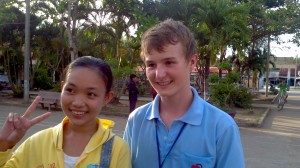 He worked hard, sweating in the heat. I heard from almost every volunteer about how hard he worked and what a good attitude he had and just how funny he was. He made many friends among the young volunteers and even attracted the attention of some 14 year old locals. The best part, though: he said he wants to be a doctor. Now that is cool.
He worked hard, sweating in the heat. I heard from almost every volunteer about how hard he worked and what a good attitude he had and just how funny he was. He made many friends among the young volunteers and even attracted the attention of some 14 year old locals. The best part, though: he said he wants to be a doctor. Now that is cool.
9. The cheapest haircuts might just be the best: We spent $2 each for Hank and Bill, $2.50 for Cat. Bill got the best treatment. No, I don’t yet need a haircut.
10. Buddah likes Choco-Pies and cigarettes.




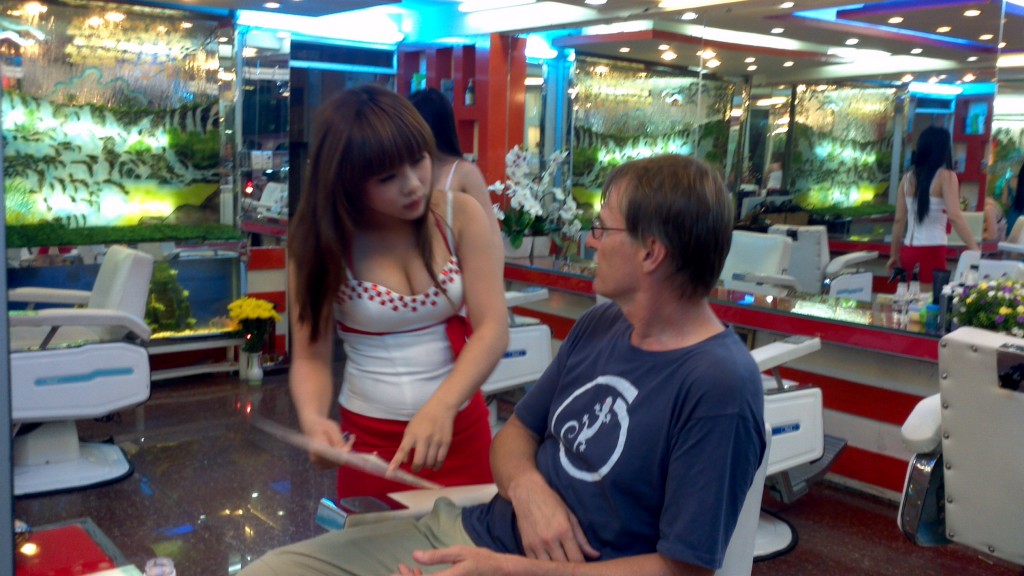

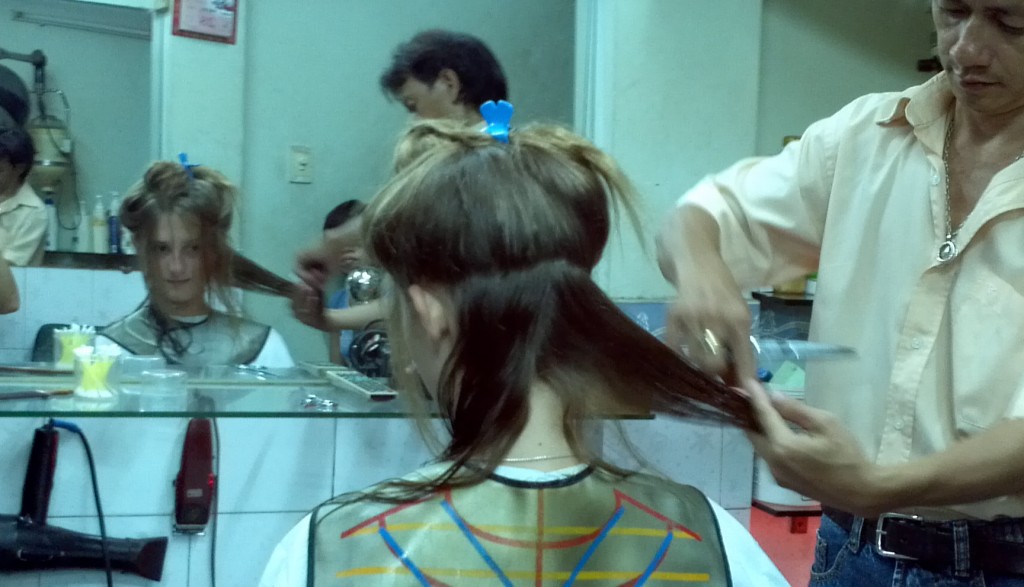
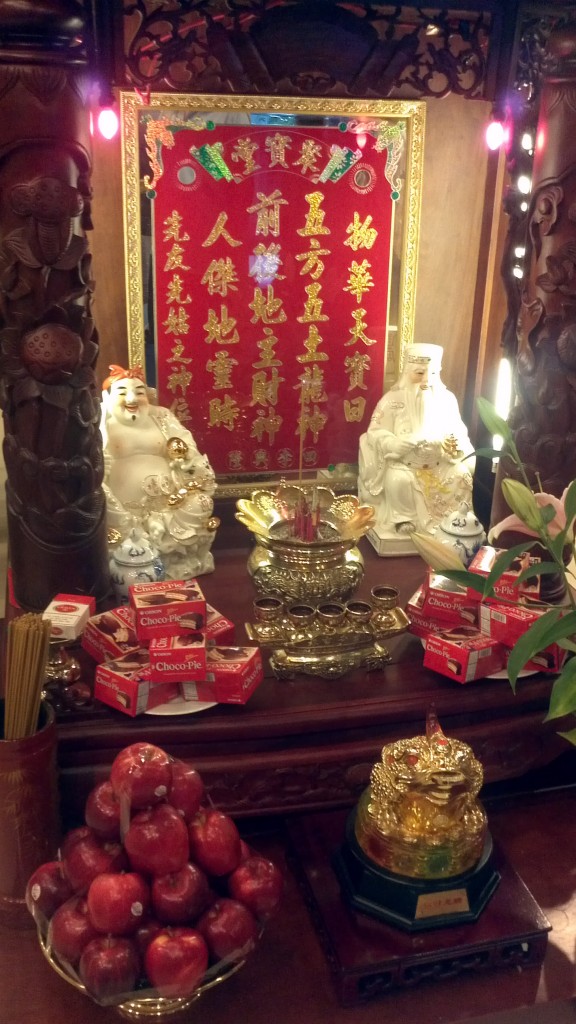
3 Responses to Lessons from Vietnam